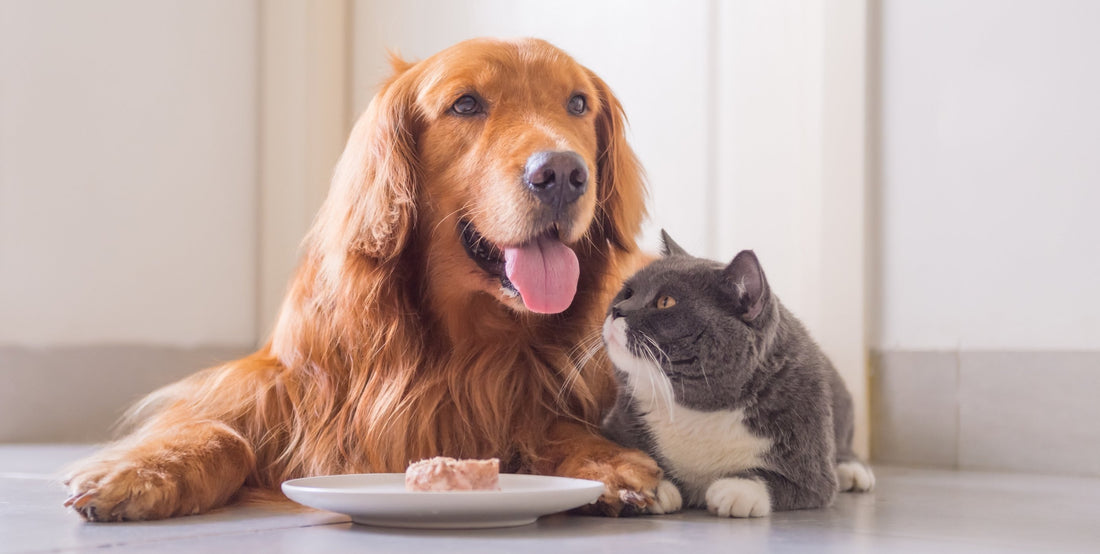
Species Appropriate Food 101: What It Means & Where To Start
Share

At Homescape Pets, we take a holistic and integrative approach to pet health and pet care. We know from experience that illness, disease, or even just unhappiness isn’t something that merely happens on its own. Animals are whole beings, influenced by the environment around them and all that their environments entail.
One example of this approach is considering your pet’s diet as a factor when it comes to allergies, intolerances, or illnesses caused by certain foods. Every living being on earth has a unique biological makeup designed to consume and process specific foods. As omnivores, humans have both flat and sharp teeth: flat teeth help grind down those yummy greens, while sharp teeth help tear through meat. That’s one way to begin understanding what species appropriate nutrition means. It’s a silly example, but for humans, species appropriate food would be almost anything edible and healthy for our bodies.
So what does species appropriate food look like for cats and dogs? It means feeding your animal as nature intended for their species. For pets, this question is a little more complex, so let’s break it down by animal and start with the canines!
Species Appropriate Food for Dogs
As you probably already know, dogs are carnivores. They have teeth that have evolved to catch prey and cut through meat. If you’ve ever watched your dog eat, you may have noticed that he or she doesn’t spend a lot of time chewing. In fact, they likely seem to swallow entire meals in seconds, as if to keep the food from disappearing on them!
Simply put, other than breaking and tearing through morsels of food, dogs really don’t chew, and that’s because carnivores have shorter digestive tracts that secrete enzymes to break up those proteins and fat. While some plant materials are safe and nutritious for dogs, it’s not great to give dogs vegetables as the dominant portion. 10% veggies is about ideal. (this doesn’t negate their positive health benefits - see some of our favorites already in your fridge here).
For these reasons and more, a species appropriate diet for dogs would include a balanced, raw, and homemade diet that consists of high grade, hormone-free meat that is also free of antibiotics. A species appropriate diet for dogs can also include raw bones, bone meal, organs, and some vegetable and fruit in limited quantities.
While dry kibble isn’t the worst thing in the world to feed your hungry canine, it’s not ideal. For starters, commercial dry food typically contains carbohydrates that your dog simply does not need at all as a carnivore. Your dog’s digestive system isn’t really designed to digest and utilize all the nutrients of plant-based ingredients, either. What their bodies truly need are good strong proteins. Aside from that, you’ll be looking for raw foods that help supplement their nutrition, ingredients that contain the vitamins and minerals that help support a well-rounded and balanced diet. Medicinal herbs are also a great addition in micro amounts.
Species Appropriate Food for Cats
Unlike dogs, cats are obligate carnivores who don’t chew unless they are performing the functional action of breaking down food to make it available for swallowing. Their teeth are also made to tear and rip through flesh, and their digestive systems are also short.
Additionally, felines are naturally designed to derive the hydration and water thier bodies need from their prey. And because so much commercial cat food (wet or dry), is so salty, it is crucially important to make sure your cat is getting more than enough water to support healthy kidney function. While it’s always important to keep their water bowl clean and full, many cats actually prefer not to drink out of still or standing water. They prefer fresh, running water, because to cats, standing water out in the wild is a breeding ground for harmful bacteria.
In fact, many veterinarians recommend feeding cats a wet diet, at least more than they are fed dry. For cats, dry commercial food is the equivalent of junk food. Even grain-free varieties of dry food are high in carbohydrates that really do significant harm to your cat's health in the long term. Wet food, on the other hand, provides a great source of hydration, minerals, and other nutrients for cats.
When looking for species appropriate food for cats, you’ll want to see that protein is listed as the first ingredient on the label, and that the meat or poultry used is fit for humans, too. Their food should also be grain-free, as cats lack the specific enzymes to help them break down and digest carbs.
Food without by-products is best, too, and although cats LOVE fishy smells and fishy foods, it’s important to keep in mind that fish-based foods (seafood) are only safe for cats in limited quantities. Seafood like salmon, tilefish, ocean whitefish, and tuna, can actually present a number of health issues due to the toxic amounts of water pollutants, heavy metals, and other contaminants found in seafood. Consider small fish species a better option, like mackerel and sardines. They are lower on the food chain and have significantly lower amounts of bioaccumulated toxins.
How To Incorporate Species Appropriate Nutrition Into Your Pet’s Diet
The world of species appropriate food is vast and can be quite overwhelming. There’s lots to explore when it comes to diet options for your dog or cat. Many pet parents have opted for a completely raw, all-natural lifestyle, which is awesome, but can be a pretty big undertaking. There’s so much to learn, especially if you decide to start giving your pet homemade food.
While feeding completely raw is optimal for some pets, it’s not always feasible for some pet parents, and that’s okay! There’s no shame in exploring other options. After all, pet health isn’t just about what’s right for your pet, but it’s also about what’s right for you, too. Luckily, Homescape Pets has plenty of options for pet parents who would like to incorporate more supplemental, species appropriate additions into their pets’ diets, regardless of whether or not they can make it a full-time endeavor!
Our Simply Natural Air-Dried Chews are an excellent addition to your pet’s diet. We were so excited to come up with something so versatile to pets, feline or canine, big or small. We’d also argue that this is a prime choice for humans, too! No, not to eat, of course, but our natural air-dried chews and treats are a great way for you to get started on getting more single-ingredient proteins into your pet’s diet.
Air-dried also means that it contains and maintains all the nutrients your pets need… nothing lost in production. And, if you’re a veteran of the all-raw lifestyle, then our chews are a great supplemental treat to help build strong joints, clean teeth, and keep your pets occupied and happy. While we offer many different selections, we would recommend our air-dried turkey patties, which are species appropriate for dogs and cats!
